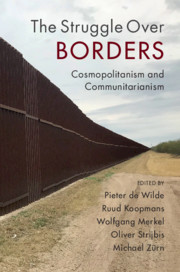Book contents
- The Struggle Over Borders
- The Struggle over Borders
- Copyright page
- Contents
- Figures
- Tables
- Contributors
- 1 Cosmopolitanism and Communitarianism – How Globalization Is Reshaping Politics in the Twenty-First Century
- Part I Domestic Impacts
- 2 Why Are Elites More Cosmopolitan than Masses?
- 3 Mass Opinions: Globalization and Issues as Axes of Contention
- 4 Mapping Policy and Polity Contestation about Globalization: Issue Linkage in the News
- Part II Supranational and Cross-Level Analyses
- Part III Conclusion
- Appendices
- References
- Index
3 - Mass Opinions: Globalization and Issues as Axes of Contention
from Part I - Domestic Impacts
Published online by Cambridge University Press: 28 June 2019
- The Struggle Over Borders
- The Struggle over Borders
- Copyright page
- Contents
- Figures
- Tables
- Contributors
- 1 Cosmopolitanism and Communitarianism – How Globalization Is Reshaping Politics in the Twenty-First Century
- Part I Domestic Impacts
- 2 Why Are Elites More Cosmopolitan than Masses?
- 3 Mass Opinions: Globalization and Issues as Axes of Contention
- 4 Mapping Policy and Polity Contestation about Globalization: Issue Linkage in the News
- Part II Supranational and Cross-Level Analyses
- Part III Conclusion
- Appendices
- References
- Index
Summary
This chapter aims to answer two general questions: Is there conflict on certain core issues relating to globalization within societies; and does the context of globalization matter for the strength of this conflict? Results show quite strong aggregate correlations between economic and cultural globalization and support for migration, between political and cultural globalization and support for internationalized governance, and some support for a relationship between problem loads and issue orientations. At the individual level, our results show that educational differences produce strong differences in issue orientations in particular regarding migration and global warming, the higher the level of education, the stronger the support for migration and, to some extent, for border-crossing authority as well, and the higher the sensitivity to environmental problems. Results also show that the contexts of globalization shape the degree how strong differences between social and ideological groups have an impact on issue orientations. Generally, the more globalized a country is, the more polarized opinions are between social and political groups in society.
Keywords
- Type
- Chapter
- Information
- The Struggle Over BordersCosmopolitanism and Communitarianism, pp. 65 - 88Publisher: Cambridge University PressPrint publication year: 2019
- 2
- Cited by



